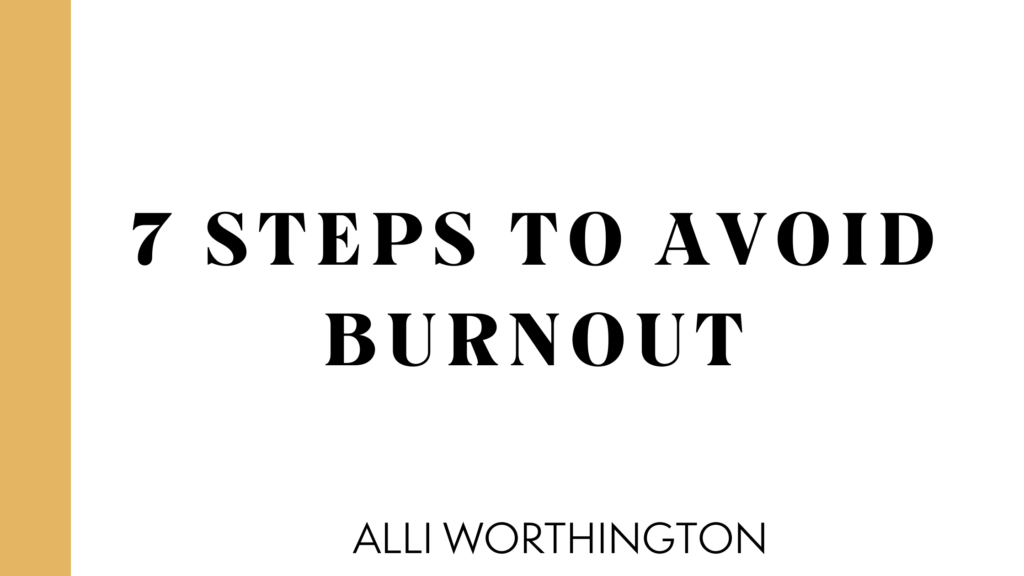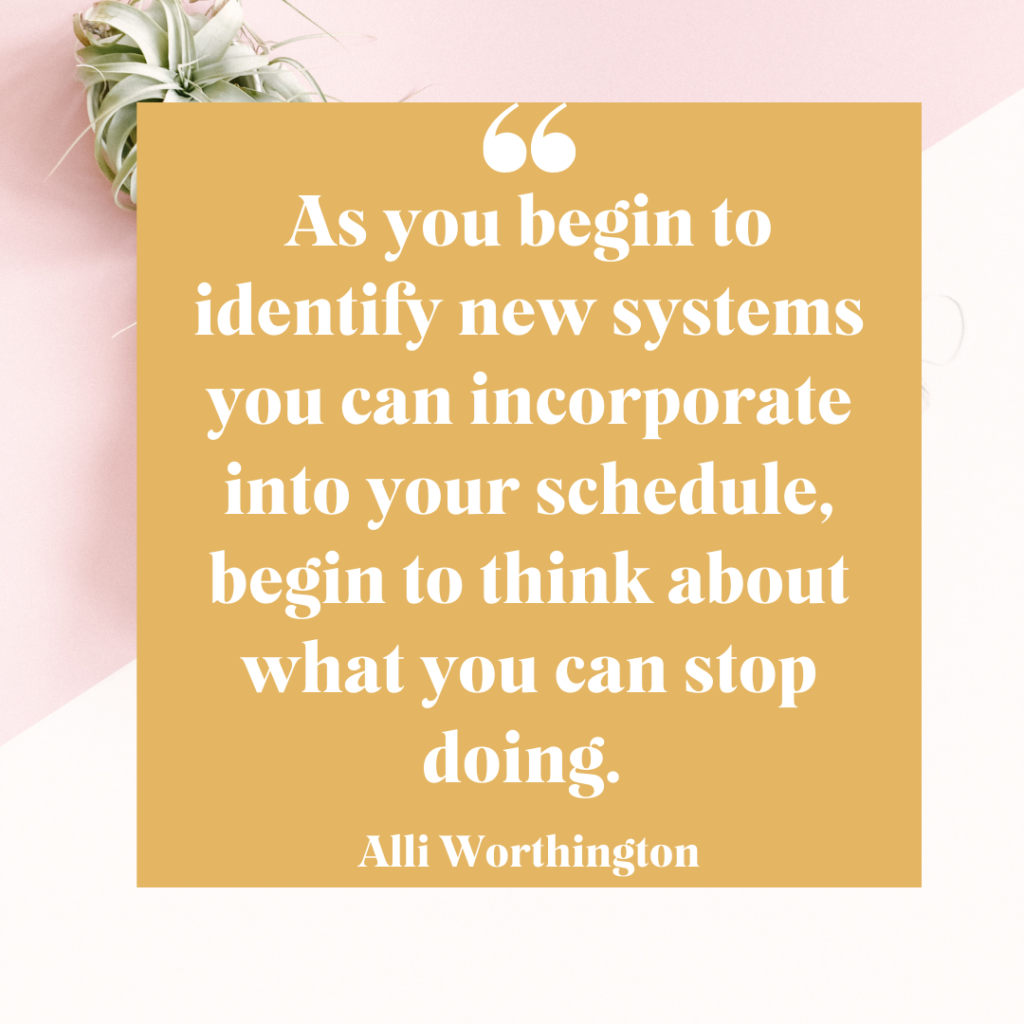You know building your brand is a crucial step to crafting your dream business. This workbook is designed with you in mind to simplify those steps.
Create a Course is Open!
7 Steps to Avoid Burnout

Who likes feeling dehydrated? Anyone? Me neither. It’s a feeling that sneaks up on you to remind you that you haven’t been taking care of yourself or your body. Unfortunately, burnout is a lot like feeling dehydrated.
You have a general idea of what you should do to prevent the symptom (i.e., drink more water), but it’s easy to neglect until your throat is parched and you can no longer ignore the feeling.
When you’re dehydrated, everything becomes more challenging. You can’t focus as well, you can’t talk as quickly, and all you can think about is finding relief.
Burnout is the same way. You have to monitor it as consistently as your water intake. You also need to ensure that you’re as cautious about the priorities on your schedule as you are your body. When you feel burned out, you can’t focus or communicate successfully. Your every thought is consumed by when the feeling will end.
According to Merriam-Webster, burnout is defined as the “exhaustion of physical or emotional strength or motivation usually as a result of prolonged stress or frustration.”
Burnout can show up as any number of these:
- A dread of Mondays
- Irritability
- Increased apathy
- Thoughts of quitting or changing roles
- Emptiness
- Isolation
- A change in appetite or sleeping patterns
- Poor concentration
- Indecisiveness
- Overspending
- Compassion fatigue
It’s time to set boundaries and take breaks because burnout is not about what’s coming out of you. Instead, it’s about what’s refilling you.
If you want to be refilled regularly so you can maintain a consistent and productive workflow, you’ll need to ensure you have boundaries in place.

1. Create a Dedicated Workspace and Start Balancing Tasks
If you’re working from home for any amount time, you must create a dedicated workspace. It will help you leave your worries and concerns in one place. I suggest you create a home office you LOVE so you enjoy spending time there.
Your dedicated workspace will signify that you’re at work. It will act as a sign to help your family recognize that they should limit distractions and requests (if possible) when you’re there (hello, mamas of young children).
It will also prevent you from working all hours of the day and night, activities which further encourage burnout.
Once you’ve identified your dedicated workspace, it’s time to think about your most important tasks. In The Coach School, I refer to these as your MITs.
These are the tasks that will help you make significant progress. Once you act upon them. They may be quite lengthy. Once you identify them, you can begin to task balance.
Task balancing will help you rotate between tasks of varying difficulty on an hourly, daily, weekly, or monthly basis when you are in your workspace.
It can free you from procrastination or the dread of significant tasks by helping you to find time to incorporate smaller, less demanding tasks throughout the day. When you balance tasks, you’ll feel as if your work is more enjoyable, and you’ll find you’re more productive.

2. Schedule Free Time
It’s easy to say that you prioritize your family, but you might begin to burn out if you fail to enjoy quality time with them.
This is one of those self-sabotaging behaviors discussed in the article on how your Enneagram number can lead you to self-sabotage. However, it’s not the only issue. If you’re failing to prioritize your family, you’re most likely failing to prioritize yourself.
Free time helps you attend to your own self-care, and it will serve as a reminder that you are a priority amidst all of the other action items on your agenda.
Choosing how you want to spend your time can increase your creativity and allow for more flexibility should you experience a delay from someone or something.
Choosing what you want to do makes you feel like you have more control when others disappoint you or disrespect your time because it reminds you that you are in the driver’s seat, according to your schedule.
Overall, incorporating free time into your schedule will improve your quality of life as you learn to set clearly defined boundaries.
Remember, stress is as much physical as it is mental, and you need established periods of rest to get away from work. Don’t feel pressured to recognize what you should do upon deciding to schedule free time.
The more you practice, the more you’ll find ways to spend your time. When you’re just starting out, everything from fifteen minutes in the morning to two weeks of vacation (and beyond) can qualify.
If you begin scheduling plans for how you’ll spend your free time, you can rest assured that the inspiration about how to spend it will start to flow soon enough.

3. Get More Sleep
Sleep regulates our mood. The Sleep Foundation reported that more than half of Americans say they feel sleepy during the day between three and seven days per week.
To further compound that, women have a lifetime risk of insomnia that is as much as 40% higher than that of men. You will undoubtedly experience burnout if you fail to get enough sleep.
Moodiness, memory troubles, and problems thinking and focusing result from sleep deprivation. To compound that, chronic sleep loss can even lead to weight gain, high blood pressure, and a weakened immune system.
All of these areas heighten the feelings of burnout you may experience.
In order to get more sleep, you’ll need to incorporate a nighttime routine that begins well before you’re preparing for bed.
Scientists define the routines that support healthy sleeping patterns as sleep hygiene. Researchers regularly conduct tests that demonstrate how much the quality of life, clarity, and productivity improve when people sleep well.
To get more sleep, stop working throughout the night. Begin scheduling a bedtime that will allow you to sleep seven or eight hours.
Yes, your middle school teacher was right. You need seven hours of sleep to focus. Turn off electronics and reduce your exposure to bright lights, resisting the urge to scroll on social media at least half an hour before bedtime.
Diet and exercise play a significant part in your ability to sleep well, too. Ensure you’re not eating large meals or consuming alcohol or caffeine before bedtime, and if you’re still struggling to fall asleep, conduct quiet activities that limit your exposure to light.
For all of you who love to focus on ambiance, ensure your bedroom is quiet, cool, and dim before getting into the bed.
4. Choose Movement and Mindfulness
Mindfulness can help you better manage fear, anger, or despair instead of being paralyzed or controlled by them. As discussed in my article on self-sabotage, emotional regulation is essential to your health.
Choosing to participate in breath work will help you feel more grounded in the moment and focus on what is in front of you. It will also help the overwhelm fade into the background.
Medical doctors and psychologists, alike, recommend mindfulness because there are direct connections to a decrease in depression and anxiety when people begin to practice it consistently.
Mindfulness will improve your ability to concentrate and contribute to a better memory. The best part is that you don’t have to find a lot of time in your day to practice mindfulness.
All you need is a few minutes, and now that there are a variety of apps to notify you when it’s time to practice, you won’t forget.
If you find you want to get serious about mindfulness, getting out for a mid-morning walk or an exercise class in the evening will also help you show up and be more present.
These activities help you process emotion and become energized to complete a task. Movement also encourages you to drink water, and that, in turn, will revive your energy and help you refocus as well.
5. Don’t Isolate!
Burnout only intensifies when you isolate. You’ll need to be around people who can help you improve your mood, and it’s important to rely on them for help.
It’s natural to want to pull away from others in an effort to manage your stress, but it actually acts counterproductively. Spend time with family and friends who help to lift your mood and take your mind off of your work.
Spending time with others who are negative will exacerbate the issue. Venting and gossiping may feel as if they bring relief, but these behaviors only lead you to focus on the areas that frustrate you.
If you need to talk about what you’re experiencing, speak with a licensed professional or someone who can help ease your frustrations, like a boss or team lead. When you spend time with others, you’ll begin to find reasons to feel grateful more often.
That gratitude, in turn, will activate your reticular activating system. Your reticular activating system draws attention to those things you focus on. When you focus on the good, it will become one large cycle that leads to even more gratitude.

6. Establish Systems
Be proactive when you realize that your schedule may have more demands than usual. Carve out some time to look at your plan, the consistent demands you face every week, and set realistic goals to help you feel accomplished every night.
It’s time to learn from your past and stop cycling back through the same struggles, but it will require you to set aside the time to do so. If you’re still concerned about how to ensure that you exit the cycle, I have a recommendation.
Establish systems that will hold you accountable. Everybody likes to talk about goals, but systems are much sexier. They’ll ultimately contribute to your success in the long run.
As you begin to identify new systems you can incorporate into your schedule, some of which I’ve already mentioned (e.g., scheduling free time and establishing a nighttime routine), begin to think about what you can stop doing.
There are, undoubtedly, patterns that you’ve picked up and activities that you continue to lead that are no longer necessary. Must you do all of the laundry or can you now delegate to your children?
After you consider those things you can stop doing, conduct a time audit to catch additional time leaks. The time you spend on social media may really be an internal cry for free time that you’ve not yet recognized.
7. Reevaluate your Passions and Interests
Burnout could indicate that you’ve outgrown former passions and interests, and it’s really time to move forward. Moving forward does not mean that you’re selfish or ungrateful.
Moving on simply means that you’ve done all you can to improve that sector, and that’s okay. It’s time to free space for someone else to add value.
If you question whether or not your passions and interests have changed, keep a bullet journal. Record your emotions before and after completing specific job-related tasks. This can be done within your planner or calendar as well.
Psychologists call it a mood journal. It can help you get to the root of the area that’s causing burnout more quickly than you might expect. It’s not a quick fix. It may take the help of a therapist, but over time, you’ll become more aware of yourself.
With the help of a mood journal, you’ll begin to identify the areas that you’re passionate about. You may even find some passions that have long grown cold. Once you do, you’ll be able to put your energy into the right opportunities.
The best thing about keeping a mood journal and making up your mind to learn about your new passions and interests is that it requires you to slow down. It’s easy to move on autopilot, but it’s here that you’ll benefit from slowing down.
Regardless of how uncomfortable it feels, the clarity you gain from your mood journal will truly honor your legacy, and that’s worth leaning into.
These tips will help you choose resilience that will move you beyond your burnout. Stress will continue to come, but you can get ahead and manage it successfully.
Remember, burnout isn’t about the energy that you’re expending. Burnout is about what’s refilling you.
Changing your life doesn’t happen by just reading great advice. It comes from taking action one step at a time. Want to be happier and healthier? Get your FREE weekly happiness action step by clicking right here.
